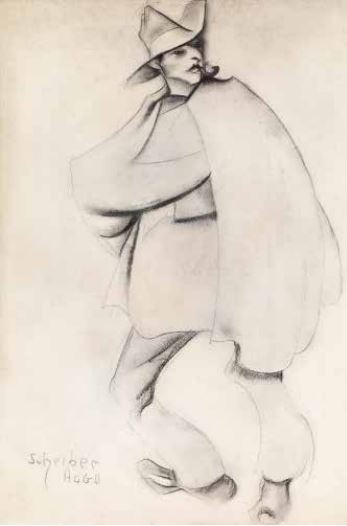Description
In the vast universe of the art of the twentieth century, the figure of Hugó Scheiber emerges as a lighthouse of Hungarian modernism. His painting "Vandor" is a work that intriguingly encapsulates his distinctive approach and his mastery in the use of color and the way to convey a narrative rich in emotion and symbolism.
In "Vandor", Scheiber presents a lonely figure that stands in the center of the composition. This character, probably a traveler, is delineated with clear and defined strokes that denote a firm intention of the artist. The position of the subject, slightly hunched over, suggests a feeling of tiredness or melancholic contemplation, which invites the viewer to reflect on the trip, both physical and spiritual, that this figure has undertaken.
One of the aspects that stands out in this work is the chromatic palette used by Scheiber. The predominant tones of brown, beiges and ocher are mixed harmoniously, creating an environment of introspection and serenity. Colors are not used as decorative elements, but function as emotional vehicles that enhance the message of the work. The choice of these earthly tones could be interpreted as a reference to the nature and connection of the human being with the earth, a recurring theme in many of Scheiber's works.
The composition of "vandor" is characterized by an asymmetric balance, where the central figure is complemented by abstract elements that surround and frame the traveler. These elements, which could represent landscapes or architectural structures, seem to blur in the background, which suggests a transition between different states of consciousness or stages of the protagonist's trip. Scheiber's technique, influenced by the dynamism of futurism and expressionism, gives the painting a feeling of movement and fluidity, despite the apparent stillness of the character.
Hugó Scheiber was an artist deeply influenced by European avant -garde movements of the early twentieth century. His work reflects a convergence of styles that includes Italian futurism, German expressionism and Russian constructivism. This amalgam of influences is clearly manifested in "Vandor", where you can see a combination of straight lines and sinuous curves, as well as a masterful game between light and shadow.
In terms of technique, Scheiber demonstrates in "Vandor" an impressive domain of the use of the Gouache and oil, two of its favorite means. The texture of the painting is rich and multicapaz, which gives it a visual depth that immediately attracts the viewer's gaze. The brushstrokes, although precise, retain a certain spontaneity that adds dynamism to the composition and prevents the image from becoming static or monotonous.
"Vandor" is not only a testimony of the artistic talent of Hugó Scheiber, but also a window to the human condition. The figure of the lonely traveler is a universal symbol of the desire for exploration and self -discovery. Through this work, Scheiber invites us to accompany its protagonist in an introspective tour, reminding us that every trip is, ultimately, a search for meaning and understanding our position in the world.
In summary, "Vandor" is a work that shines not only for its technical execution, but also for its ability to evoke a deep emotional reflection. Scheiber, with its unique combination of stylistic influences and your personal vision, gives us a painting that is both a visual delight and poetic meditation on the act of traveling.
KUADROS ©, a famous paint on your wall.
Hand-made oil painting reproductions, with the quality of professional artists and the distinctive seal of KUADROS ©.
Art reproduction service with satisfaction guarantee. If you are not completely satisfied with the replica of your painting, we refund your money 100%.

